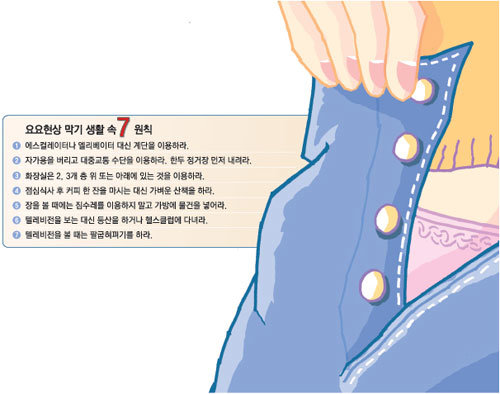Winter Is Weight Gain Season

Thirty-two year old office worker Lee cannot help but become tense when she thinks about last winter.
Lees weight was about 55kg mid-way through 2004. By reducing her food intake and regularly exercising, she reduced her weight to 48kg by late October. It was her mistake to think that she had succeeded in losing weight, however. She gained it all back, up to 59kg, by late January of this year.
Many people succeed in losing weight, but gain the shed weight once again. This is the so called yoyo phenomenon. Usually, even when succeeding in shedding extra weight, one should keep that weight for two to three years to avoid the yoyo phenomenon.
Of course, it is not an easy task.
When one experiences several yoyo phenomena, one becomes afraid of losing weight. Lee has started a new diet and is currently keeping her weight around 50kg. So what should she do now?
Why Does One Regain Weight in Winter?
The seasonal features of winter, cold and long nights, play a great factor. Compared to other seasons, one seeks warm places indoors, hence ones level of activity will decrease. Another reason is that by wearing various layers of clothing, the belly will not look as big as it is, hence letting ones guard down over obesity.
The yoyo phenomenon is a very natural physical reaction. In other words, it is natural for the body to return to its original weight after weight has been lost. Therefore, instead of just blaming the body, one should know why this occurs.
When losing weight, the bodys craving for food only becomes stronger. The amount of energy used in a day also decreases with the weight loss. All these phenomena occur because of the bodys tendency to store fat in the body. In addition, the activities of enzymes breaking down fat will substantially decrease. Despite ones will, the body will act in the direction of gaining weight.
To Prevent the Yoyo Phenomenon
Since the body is always preparing to gain weight once again, even if one stops a dieting program, one should keep the amount of food ingested the same as when dieting. If the amount of food is increased, then it should be done by only a slight margin. If one is satisfied by losing a few kilograms of weight, and starts eating like he or she did before losing weight, in most cases, the weight will come back.
When going to year-end parties, one should set a limit on how much to eat and drink. Furthermore, the day after eating or drinking excessively, one should eat less than usual to avoid fat building up in the body. High calorie foods such as pizza and hamburgers should also be avoided. By eating fruits and vegetables, one can feel full and reduce the intake of calories.
With increased time watching TV or videos indoors, one will unconsciously eat snacks. So in such cases, one should not bring any food at all.
Dont also shop when youre hungry, because nine out of 10 times you will be looking for something to eat. In addition, when eating a meal, eat slowly and drink water between bites.
Bother Your Body
Aside from controlling food intake, it is also important not to skip exercising. One of the reasons for the yoyo phenomenon is because the muscles are weakened. When the muscles are strengthened, the amount of energy used will also increase. Hence, it is advised to keep working out such as by swimming, weight lifting, or doing aerobics.
If you cant work out, try increasing your activities in trivial places, and in order to do that, you must bother yourself.
For example, if you commute by car, intentionally park somewhere far away and walk more, or use the stairs instead of the elevator. Another example would be using a restroom two to three floors above or below you.
In order to keep a little tense, it is also advised, to wear tight clothing rather than loose.
Sang-Hoon Kim corekim@donga.com







